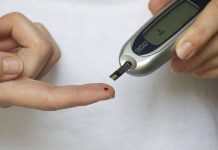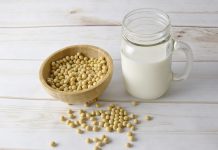With hot flashes, night sweats, changes in mood, added stress and anxiety, trouble sleeping, decreased energy, lack of focus, and much more, this can be an extremely difficult period of time for women. Symptoms can even include decreases in bone density and increased risks for fractures and certain illnesses, like heart disease. Some may be lucky enough to experience little to no symptoms, while other women can struggle and suffer daily.
“Decrease in estrogen levels can negatively impact the body in several ways”

This transitional stage when one’s menstrual cycle comes to an end officially begins approximately 12 months after the last menstrual period. The transition, along with its symptoms, may be experienced for several years. During this time, there is a decline in the hormone estrogen, which interrupts the body’s natural estrogen and progesterone cycles.
Decrease in estrogen levels can negatively impact the body in several ways. The effects on metabolism may lead to weight gain, cholesterol issues, and the way the body digests carbohydrates.
Luckily, there are many easy, natural habits you can learn that may help relieve and prevent some symptoms. Altering your diet is one simple solution that may offer you a welcome wave of relief.
The Importance of Eating Healthy During Menopause
Diet, of course, can directly impact one’s health and well being in countless ways, and studies have shown that it can help alleviate and prevent symptoms as well. Certain foods have been linked to providing relief for many symptoms, such as hot flashes, anxiety, and difficulty sleeping.
Dairy products, like milk, cheese, and yogurt, and foods high in vitamins D and K, calcium, phosphorus, magnesium, and potassium can help improve bone density and strength. Omega-3 fatty acids and other healthy fats found in certain fish, like salmon and mackerel, and seeds, such as hemp, flax, and chia seeds, may help reduce the occurrence and severity of hot flashes and night sweats.
Packed with vitamins and minerals, fruits and vegetables are always important staples in a healthy diet; however, some can help with symptoms as well. Dark berries can assist in lowering blood pressure and cruciferous vegetables can help in preventing breast cancer.
The Top 15 Foods To Avoid During Menopause
“Avoiding spicy foods, which produce heat in the body, may help prevent and reduce hot flashes and night sweats”

While some foods may help relieve symptoms, many foods can trigger, increase, or exacerbate them. Here is a list of the top 15 foods to avoid during menopause.
1. Added Sugars
Studies have revealed that it is not uncommon for menopausal women to experience hot flashes due to insulin resistance, high blood pressure, and metabolic syndrome. Foods that raise blood sugar levels rapidly, such as candy and added sugars, can induce hot flashes and make them more severe.
2. Alcohol
Alcohol can act as a trigger of hot flashes and it can increase their severity as well. It can also disrupt sleep and intensify sleep issues. If you are experiencing night sweats, you should definitely try avoiding alcoholic beverages close to and at bedtime.
3. Caffeine
Although studies have shown that caffeine can help decrease hot flashes for some women, it is a trigger of hot flashes for many and can intensify them as well. Caffeine can also seriously affect sleep and can cause insomnia and other sleep disturbances; so if your symptoms include difficulty sleeping or other sleep issues, avoid caffeine and caffeinated beverages in the evening and at night.
4. Spicy Foods
Avoiding spicy foods, which produce heat in the body, may help prevent and reduce hot flashes and night sweats.
5. High Salt Foods
Decreased bone density has been linked to a high intake of salty foods in menopausal women. Reducing sodium intake can also help prevent against high blood pressure, water retention, and can actually improve mood as well. Avoid snacks such as potato chips, pretzels, and other high sodium foods.
6. Trans Fats
Saturated fat and trans fat can raise cholesterol and increase heart disease risk. Foods containing these, such as whole milk, cheese, ice cream, fatty meats, vegetable oils, some margarine, and some baked goods should be limited or avoided.
7. Smoked, Salt-cured, and Char-broiled Foods
Smoked, salt-cured, and char-broiled foods containing high levels of nitrates have been shown to cause cancer in some people. They can also trigger many symptoms, including high blood pressure and hot flashes.
8. Fast Food

Of course, fast food can be quick, simple, and delicious, but it may cause an onslaught of symptoms as well, such as weight gain and increased risk of heart disease. Extremely convenient, yet usually high in fat, sodium, sugar, and other unhealthy ingredients, you may want to avoid fast food all together.
9. Fatty Meats
Fatty meats can lower the body’s serotonin levels, which, in turn, can cause increased irritability, anger, and other negative emotions.
10. Hot Beverages
The hot temperature of your drink may trigger a hot flash or intensify your discomfort if you are already enduring one.
11. Processed Carbohydrates
Avoiding items like white bread, white rice, crackers, baked goods, and other processed foods can help prevent hot flashes and decrease their severity.
12. Coffee
Coffee, especially served hot, can induce hot flashes, intensify them, and increase anxiety and sleep disturbances.
13. Cold Cuts
High in sodium, cold cuts and deli meats can cause water retention, bloating, high blood pressure, and other symptoms.
14. Coffee Creamer
Coffee creamers can contain high levels of trans fats or hydrogenated oil, which can increase cholesterol, affect memory, and cause other symptoms.
15. Bacon and Sausage
Avoid these and other foods high in nitrates, sodium, and other harmful ingredients.
“Altering your diet is one simple solution that may offer you a welcome wave of relief”
This transitional stage when one’s menstrual cycle comes to an end officially begins approximately 12 months after the last menstrual period. The transition, along with its symptoms, may be experienced for several years. Some may be lucky enough to experience little to no symptoms, while other women can struggle and suffer daily.
Luckily, there are many easy, natural habits you can learn that may help relieve and prevent some symptoms. Altering your diet is one simple solution that may offer you a welcome wave of relief.
Sources & References:
www.healthline.com/nutrition/menopause-diet
www.webmd.com/menopause/guide/staying-healthy-through-good-nuitrition#1
www.everydayhealth.com/hs/menopause-resource-center/foods-to-avoid/
www.thorne.com/take-5-daily/article/6-foods-to-avoid-during-menopause





















